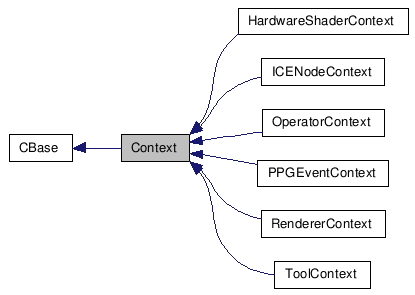Detailed Description
This is a general, flexible Context object that is used for callbacks. Instances of this object are used to pass information to the C++ API callbacks that implement a PluginItem.
The main reason context objects are used in XSI is to ensure backward compatibility for XSI plugins. In future versions it will be possible to add additional information and functionality to the context object without changing the signature of the callback routines.
In some cases a specialized class will be provided rather than a basic Context object. Some of these classes derive from Context (as is the case with PPGEventContext) whereas others do not (for example PluginRegistrar).
- See also:
- PPGEventContext, UpdateContext, PluginRegistrar
- Since:
- 4.0
#include <xsi_context.h>

Public Member Functions |
|
| Context () | |
| ~Context () | |
| Context (const CRef &in_ref) | |
| Context (const Context &in_obj) | |
| bool | IsA (siClassID in_ClassID) const |
| siClassID | GetClassID () const |
| Context & | operator= (const Context &in_obj) |
| Context & | operator= (const CRef &in_ref) |
| CRef | GetSource () const |
| CValue | GetAttribute (const CString &in_AttributeName) |
| CStatus | PutAttribute (const CString &in_AttributeName, const CValue &in_val) |
| CStatus | PutArrayAttribute (const CString &in_AttributeName, const CRefArray &in_array) |
| CRefArray | GetArrayAttribute (const CString &in_AttributeName) const |
| CValue | GetUserData () |
| CStatus | PutUserData (const CValue &in_val) |
Constructor & Destructor Documentation
| Context | ( | ) |
Default constructor.
| ~Context | ( | ) |
Default destructor.
Member Function Documentation
| bool IsA | ( | siClassID | in_ClassID | ) | const [virtual] |
Returns true if a given class type is compatible with this API class.
- Parameters:
-
in_ClassID class type.
- Returns:
- true if the class is compatible, false otherwise.
Reimplemented from CBase.
Reimplemented in HardwareShaderContext, ICENodeContext, OperatorContext, PPGEventContext, RendererContext, and ToolContext.
| siClassID GetClassID | ( | ) | const [virtual] |
Returns the type of the API class.
- Returns:
- The class type.
Implements CBase.
Reimplemented in HardwareShaderContext, ICENodeContext, OperatorContext, PPGEventContext, RendererContext, and ToolContext.
Creates an object from another object.
- Parameters:
-
in_obj constant class object.
- Returns:
- The new Context object.
Creates an object from a reference object. The newly created object is set to empty if the input reference object is not compatible.
- Parameters:
-
in_ref constant class object.
- Returns:
- The new Context object.
Reimplemented in HardwareShaderContext, ICENodeContext, OperatorContext, PPGEventContext, RendererContext, and ToolContext.
| CRef GetSource | ( | ) | const |
Returns the object that is the cause of the callback being
fired. The type of object returned depends on the callback. For
example this returns a
CustomProperty object in the context of a Define
callback for a
CustomProperty
PluginItem, and it returns a
PPGLayout object in the context of a DefineLayout
callback. This specific information is documented along with the
callbacks of each
PluginItem.
- See also:
- PluginRegistrar::RegisterProperty
- Returns:
- A reference to the plug-in item.
Returns an attribute on the context. Attributes are used to provide additional context information above and beyond the object returned by Context::GetSource. Supported attributes, if any, are documented along with the callbacks of each PluginItem.
- Parameters:
-
in_AttributeName The name of the attribute to get.
- Returns:
- The attribute value.
- See also:
- PPG.Inspected (object model equivalent of PPGEventContext::GetSource)
Sets a single attribute value on the context. This is a way to pass additional information or instructions to XSI regarding the outcome of the callback. Supported attributes, if any, are documented along with the callbacks of each PluginItem. If the attribute does not exist it is added, otherwise the existing value is replaced by the new value.
- Parameters:
-
in_AttributeName The name of the attribute to set. in_val The attribute value to set.
- Returns:
- CStatus::OK
- CStatus::Fail
Sets an attribute value as an array of values on the context. If the attribute does not exist it is added, otherwise the existing value is replaced by the new value.
- Parameters:
-
in_AttributeName The name of the attribute to set. in_array The attribute values to set.
- Returns:
- CStatus::OK
- CStatus::Fail
Returns an attribute value as an array of values on the context.
- Parameters:
-
in_AttributeName The name of the attribute to get.
- Returns:
- The attribute values to get.
| CValue GetUserData | ( | ) |
Returns the user data stored in the context.
- Returns:
- The raw user data.
Allows you to store a
CValue inside the context object. This is called User
Data because XSI does not care about the content or
meaning of the data. This information is not persisted. A common
use for this feature is to store a pointer to a newly allocated C++
object during an Init callback, and then to use
Context::GetUserData
to retrieve the pointer when other callbacks are called.
- Warning:
- In the case where a pointer is stored during the
Initcallback, the object should be destroyed during theTermcallback.
- Parameters:
-
in_val User data to be set.
- Returns:
- CStatus::OK success
- CStatus::Fail failure.
The documentation for this class was generated from the following file:
